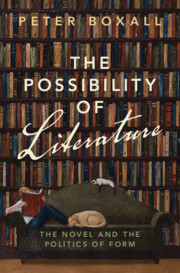Book contents
- The Possibility of Literature
- The Possibility of Literature
- Copyright page
- Dedication
- Epigraph
- Contents
- Figures
- Acknowledgements
- Introduction
- Part I On Writers
- Part II On Literary History
- Chapter 7 The Threshold of Vision
- Chapter 8 The Anatomy of Realism
- Chapter 9 Back Roads
- Chapter 10 Blind Seeing
- Chapter 11 Mere Being
- Part III On the Contemporary
- Notes
- Bibliography
- Index
Chapter 11 - Mere Being
Imagination at the End of the Mind
from Part II - On Literary History
Published online by Cambridge University Press: 10 October 2024
- The Possibility of Literature
- The Possibility of Literature
- Copyright page
- Dedication
- Epigraph
- Contents
- Figures
- Acknowledgements
- Introduction
- Part I On Writers
- Part II On Literary History
- Chapter 7 The Threshold of Vision
- Chapter 8 The Anatomy of Realism
- Chapter 9 Back Roads
- Chapter 10 Blind Seeing
- Chapter 11 Mere Being
- Part III On the Contemporary
- Notes
- Bibliography
- Index
Summary
To think about the limits (of a text, of a being, of a place) is to think about adulteration. It is to recognise that, at their limits, things merge with other things.
This essay proposes that such thinking has taken on a particular urgency in our own time, an urgency that is at once biopolitical and geopolitical. The spread of a virus has forced us to examine our individual biopolitical limits, as the collapse of a geopolitical ideology – one which allied US capital to progressive democratisation – has forced us to examine the boundaries, between east and west, between north and south, that have shaped the global distribution of wealth and force.
Under these conditions there is a tendency to immerse ourselves in our own person, to withdraw from the porous limits of self, of household, of nation, to some ground zero of being. We look to the imagined grounds of a minimal life that is self-directed and self-sufficient, that is proof against contamination by whatever lies beyond its pale.
We might call this contracted state a condition of mere being – the mere being that remains when our political life, our being in relation to others, is attenuated or forsaken. But this essay suggests that close attention to literary accounts of mere being, from Henry James to Wallace Stevens to Samuel Beckett, helps us to see that poetic mereness is not a denial of shared being, but a particular means of imagining it, a means of approaching that place where we are conjoined with others. In tracing a poetic tradition of mere being, the essay argues that what we find in the dramatically denuded self is not a retreat from limits, but an encounter with them – an encounter which grants us a new way of imagining what Densher calls, in The Wings of the Dove, ‘our being as we are’.
- Type
- Chapter
- Information
- The Possibility of LiteratureThe Novel and the Politics of Form, pp. 227 - 252Publisher: Cambridge University PressPrint publication year: 2024

